Comprehensive Analysis: Holistic Mental Health Assessment Approach
VerifiedAdded on 2023/06/11
|13
|3927
|206
Essay
AI Summary
This essay critically reflects on the key approaches and professional capabilities in mental health assessment, emphasizing holistic wellness. It demonstrates an understanding of clinical formulation and holistic assessment, underpinned by critical thinking. The assessment covers psychological, physical, intellectual, and spiritual aspects, including physical examinations, psychological tests, and evaluations of social and cultural influences. The nursing psychiatric evaluation involves assessing the patient, identifying problems, diagnosing, setting outcomes, and formulating a care plan. Key components of a thorough assessment include biopsychosocial history, psychiatric history, substance use, medical history, family history, developmental history, social history, occupational and educational history, cultural history, and spiritual assessment, all aimed at providing patient-centered care and effective treatment.
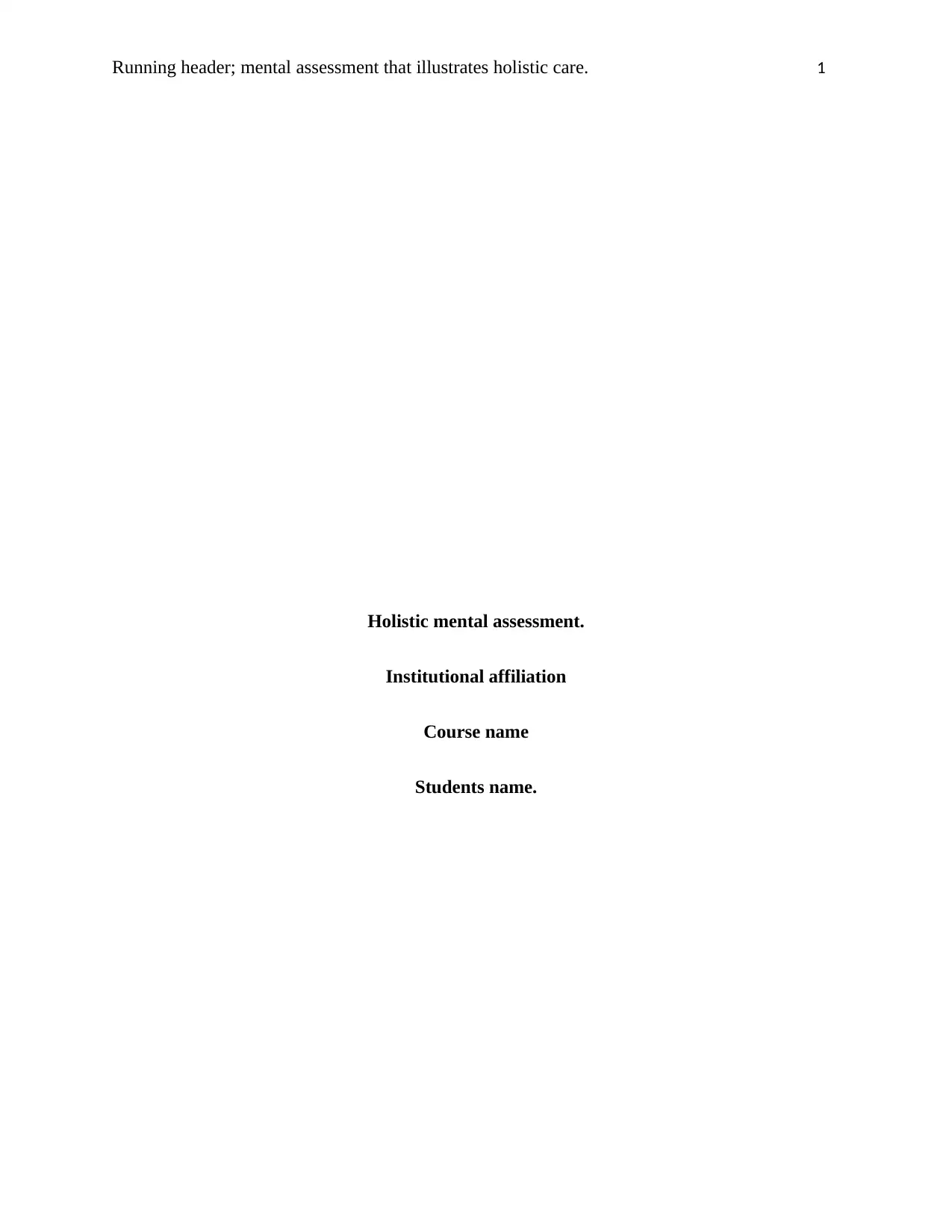
Running header; mental assessment that illustrates holistic care. 1
Holistic mental assessment.
Institutional affiliation
Course name
Students name.
Holistic mental assessment.
Institutional affiliation
Course name
Students name.
Paraphrase This Document
Need a fresh take? Get an instant paraphrase of this document with our AI Paraphraser
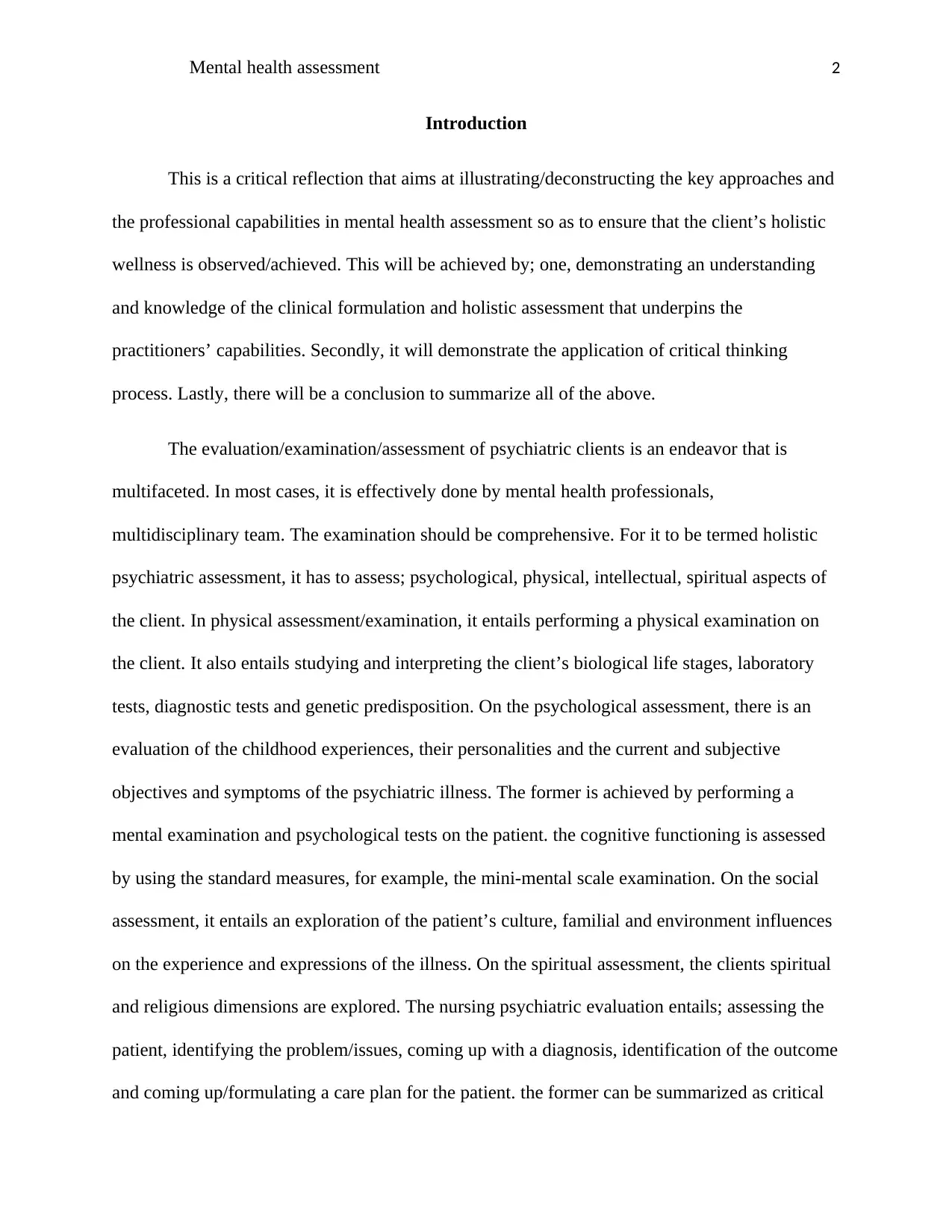
Mental health assessment 2
Introduction
This is a critical reflection that aims at illustrating/deconstructing the key approaches and
the professional capabilities in mental health assessment so as to ensure that the client’s holistic
wellness is observed/achieved. This will be achieved by; one, demonstrating an understanding
and knowledge of the clinical formulation and holistic assessment that underpins the
practitioners’ capabilities. Secondly, it will demonstrate the application of critical thinking
process. Lastly, there will be a conclusion to summarize all of the above.
The evaluation/examination/assessment of psychiatric clients is an endeavor that is
multifaceted. In most cases, it is effectively done by mental health professionals,
multidisciplinary team. The examination should be comprehensive. For it to be termed holistic
psychiatric assessment, it has to assess; psychological, physical, intellectual, spiritual aspects of
the client. In physical assessment/examination, it entails performing a physical examination on
the client. It also entails studying and interpreting the client’s biological life stages, laboratory
tests, diagnostic tests and genetic predisposition. On the psychological assessment, there is an
evaluation of the childhood experiences, their personalities and the current and subjective
objectives and symptoms of the psychiatric illness. The former is achieved by performing a
mental examination and psychological tests on the patient. the cognitive functioning is assessed
by using the standard measures, for example, the mini-mental scale examination. On the social
assessment, it entails an exploration of the patient’s culture, familial and environment influences
on the experience and expressions of the illness. On the spiritual assessment, the clients spiritual
and religious dimensions are explored. The nursing psychiatric evaluation entails; assessing the
patient, identifying the problem/issues, coming up with a diagnosis, identification of the outcome
and coming up/formulating a care plan for the patient. the former can be summarized as critical
Introduction
This is a critical reflection that aims at illustrating/deconstructing the key approaches and
the professional capabilities in mental health assessment so as to ensure that the client’s holistic
wellness is observed/achieved. This will be achieved by; one, demonstrating an understanding
and knowledge of the clinical formulation and holistic assessment that underpins the
practitioners’ capabilities. Secondly, it will demonstrate the application of critical thinking
process. Lastly, there will be a conclusion to summarize all of the above.
The evaluation/examination/assessment of psychiatric clients is an endeavor that is
multifaceted. In most cases, it is effectively done by mental health professionals,
multidisciplinary team. The examination should be comprehensive. For it to be termed holistic
psychiatric assessment, it has to assess; psychological, physical, intellectual, spiritual aspects of
the client. In physical assessment/examination, it entails performing a physical examination on
the client. It also entails studying and interpreting the client’s biological life stages, laboratory
tests, diagnostic tests and genetic predisposition. On the psychological assessment, there is an
evaluation of the childhood experiences, their personalities and the current and subjective
objectives and symptoms of the psychiatric illness. The former is achieved by performing a
mental examination and psychological tests on the patient. the cognitive functioning is assessed
by using the standard measures, for example, the mini-mental scale examination. On the social
assessment, it entails an exploration of the patient’s culture, familial and environment influences
on the experience and expressions of the illness. On the spiritual assessment, the clients spiritual
and religious dimensions are explored. The nursing psychiatric evaluation entails; assessing the
patient, identifying the problem/issues, coming up with a diagnosis, identification of the outcome
and coming up/formulating a care plan for the patient. the former can be summarized as critical
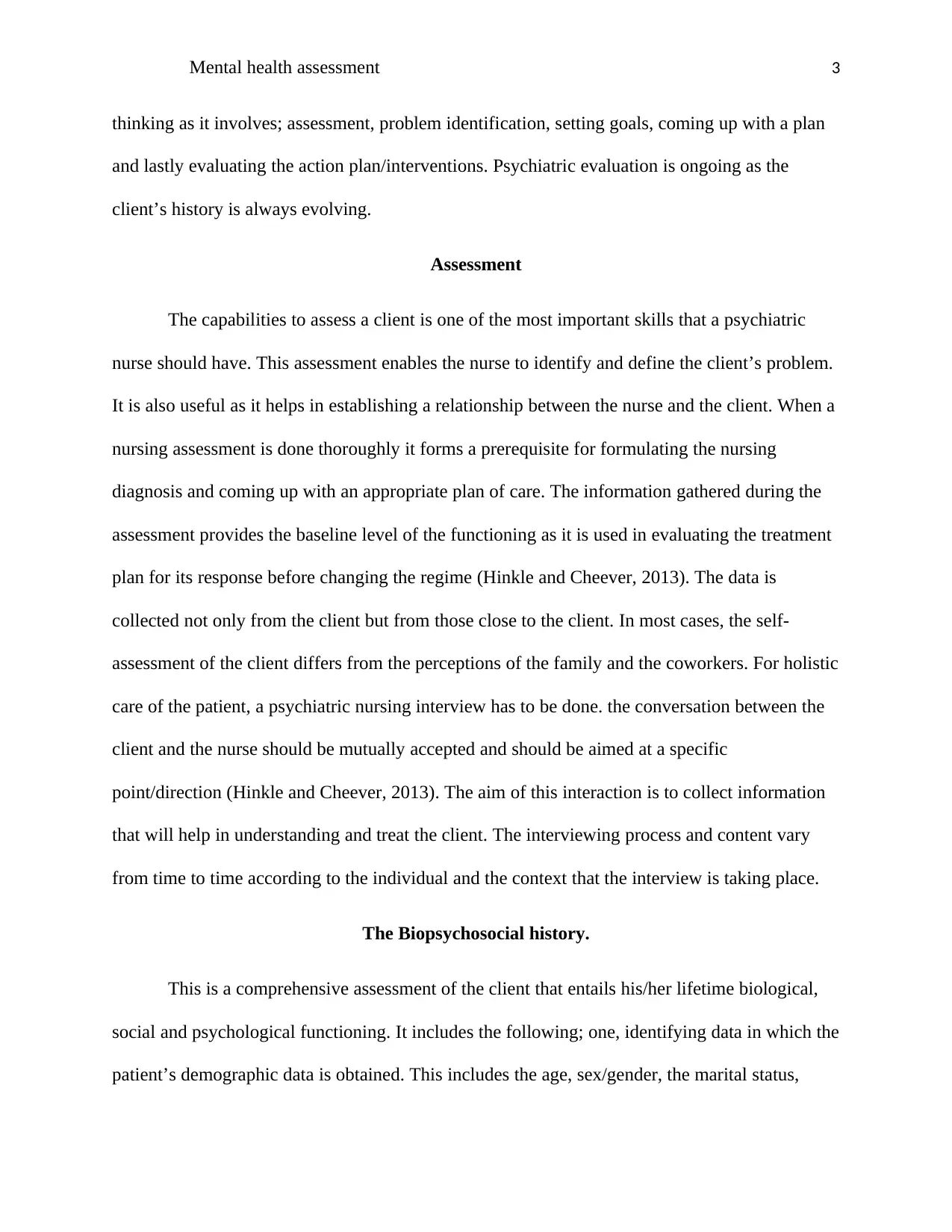
Mental health assessment 3
thinking as it involves; assessment, problem identification, setting goals, coming up with a plan
and lastly evaluating the action plan/interventions. Psychiatric evaluation is ongoing as the
client’s history is always evolving.
Assessment
The capabilities to assess a client is one of the most important skills that a psychiatric
nurse should have. This assessment enables the nurse to identify and define the client’s problem.
It is also useful as it helps in establishing a relationship between the nurse and the client. When a
nursing assessment is done thoroughly it forms a prerequisite for formulating the nursing
diagnosis and coming up with an appropriate plan of care. The information gathered during the
assessment provides the baseline level of the functioning as it is used in evaluating the treatment
plan for its response before changing the regime (Hinkle and Cheever, 2013). The data is
collected not only from the client but from those close to the client. In most cases, the self-
assessment of the client differs from the perceptions of the family and the coworkers. For holistic
care of the patient, a psychiatric nursing interview has to be done. the conversation between the
client and the nurse should be mutually accepted and should be aimed at a specific
point/direction (Hinkle and Cheever, 2013). The aim of this interaction is to collect information
that will help in understanding and treat the client. The interviewing process and content vary
from time to time according to the individual and the context that the interview is taking place.
The Biopsychosocial history.
This is a comprehensive assessment of the client that entails his/her lifetime biological,
social and psychological functioning. It includes the following; one, identifying data in which the
patient’s demographic data is obtained. This includes the age, sex/gender, the marital status,
thinking as it involves; assessment, problem identification, setting goals, coming up with a plan
and lastly evaluating the action plan/interventions. Psychiatric evaluation is ongoing as the
client’s history is always evolving.
Assessment
The capabilities to assess a client is one of the most important skills that a psychiatric
nurse should have. This assessment enables the nurse to identify and define the client’s problem.
It is also useful as it helps in establishing a relationship between the nurse and the client. When a
nursing assessment is done thoroughly it forms a prerequisite for formulating the nursing
diagnosis and coming up with an appropriate plan of care. The information gathered during the
assessment provides the baseline level of the functioning as it is used in evaluating the treatment
plan for its response before changing the regime (Hinkle and Cheever, 2013). The data is
collected not only from the client but from those close to the client. In most cases, the self-
assessment of the client differs from the perceptions of the family and the coworkers. For holistic
care of the patient, a psychiatric nursing interview has to be done. the conversation between the
client and the nurse should be mutually accepted and should be aimed at a specific
point/direction (Hinkle and Cheever, 2013). The aim of this interaction is to collect information
that will help in understanding and treat the client. The interviewing process and content vary
from time to time according to the individual and the context that the interview is taking place.
The Biopsychosocial history.
This is a comprehensive assessment of the client that entails his/her lifetime biological,
social and psychological functioning. It includes the following; one, identifying data in which the
patient’s demographic data is obtained. This includes the age, sex/gender, the marital status,
⊘ This is a preview!⊘
Do you want full access?
Subscribe today to unlock all pages.

Trusted by 1+ million students worldwide
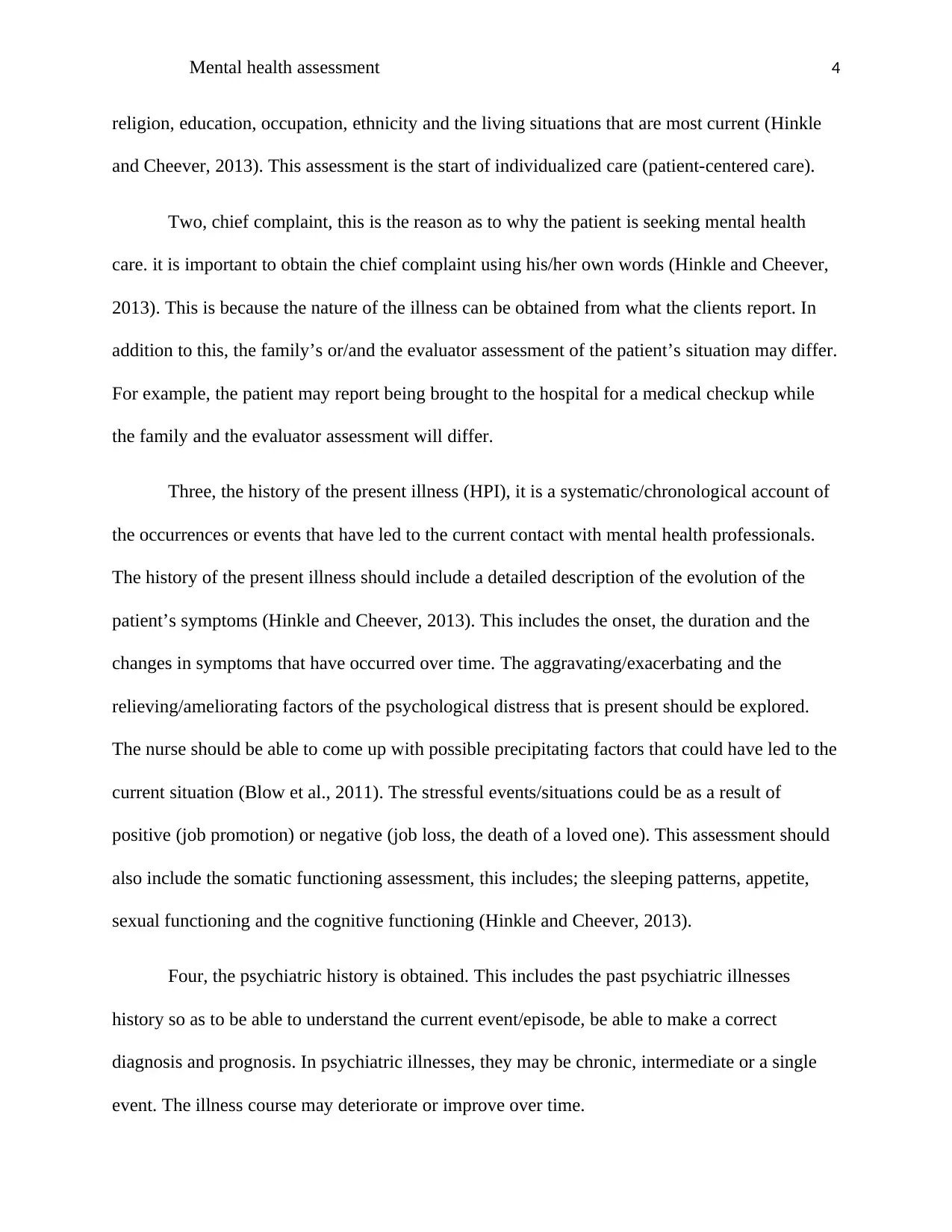
Mental health assessment 4
religion, education, occupation, ethnicity and the living situations that are most current (Hinkle
and Cheever, 2013). This assessment is the start of individualized care (patient-centered care).
Two, chief complaint, this is the reason as to why the patient is seeking mental health
care. it is important to obtain the chief complaint using his/her own words (Hinkle and Cheever,
2013). This is because the nature of the illness can be obtained from what the clients report. In
addition to this, the family’s or/and the evaluator assessment of the patient’s situation may differ.
For example, the patient may report being brought to the hospital for a medical checkup while
the family and the evaluator assessment will differ.
Three, the history of the present illness (HPI), it is a systematic/chronological account of
the occurrences or events that have led to the current contact with mental health professionals.
The history of the present illness should include a detailed description of the evolution of the
patient’s symptoms (Hinkle and Cheever, 2013). This includes the onset, the duration and the
changes in symptoms that have occurred over time. The aggravating/exacerbating and the
relieving/ameliorating factors of the psychological distress that is present should be explored.
The nurse should be able to come up with possible precipitating factors that could have led to the
current situation (Blow et al., 2011). The stressful events/situations could be as a result of
positive (job promotion) or negative (job loss, the death of a loved one). This assessment should
also include the somatic functioning assessment, this includes; the sleeping patterns, appetite,
sexual functioning and the cognitive functioning (Hinkle and Cheever, 2013).
Four, the psychiatric history is obtained. This includes the past psychiatric illnesses
history so as to be able to understand the current event/episode, be able to make a correct
diagnosis and prognosis. In psychiatric illnesses, they may be chronic, intermediate or a single
event. The illness course may deteriorate or improve over time.
religion, education, occupation, ethnicity and the living situations that are most current (Hinkle
and Cheever, 2013). This assessment is the start of individualized care (patient-centered care).
Two, chief complaint, this is the reason as to why the patient is seeking mental health
care. it is important to obtain the chief complaint using his/her own words (Hinkle and Cheever,
2013). This is because the nature of the illness can be obtained from what the clients report. In
addition to this, the family’s or/and the evaluator assessment of the patient’s situation may differ.
For example, the patient may report being brought to the hospital for a medical checkup while
the family and the evaluator assessment will differ.
Three, the history of the present illness (HPI), it is a systematic/chronological account of
the occurrences or events that have led to the current contact with mental health professionals.
The history of the present illness should include a detailed description of the evolution of the
patient’s symptoms (Hinkle and Cheever, 2013). This includes the onset, the duration and the
changes in symptoms that have occurred over time. The aggravating/exacerbating and the
relieving/ameliorating factors of the psychological distress that is present should be explored.
The nurse should be able to come up with possible precipitating factors that could have led to the
current situation (Blow et al., 2011). The stressful events/situations could be as a result of
positive (job promotion) or negative (job loss, the death of a loved one). This assessment should
also include the somatic functioning assessment, this includes; the sleeping patterns, appetite,
sexual functioning and the cognitive functioning (Hinkle and Cheever, 2013).
Four, the psychiatric history is obtained. This includes the past psychiatric illnesses
history so as to be able to understand the current event/episode, be able to make a correct
diagnosis and prognosis. In psychiatric illnesses, they may be chronic, intermediate or a single
event. The illness course may deteriorate or improve over time.
Paraphrase This Document
Need a fresh take? Get an instant paraphrase of this document with our AI Paraphraser
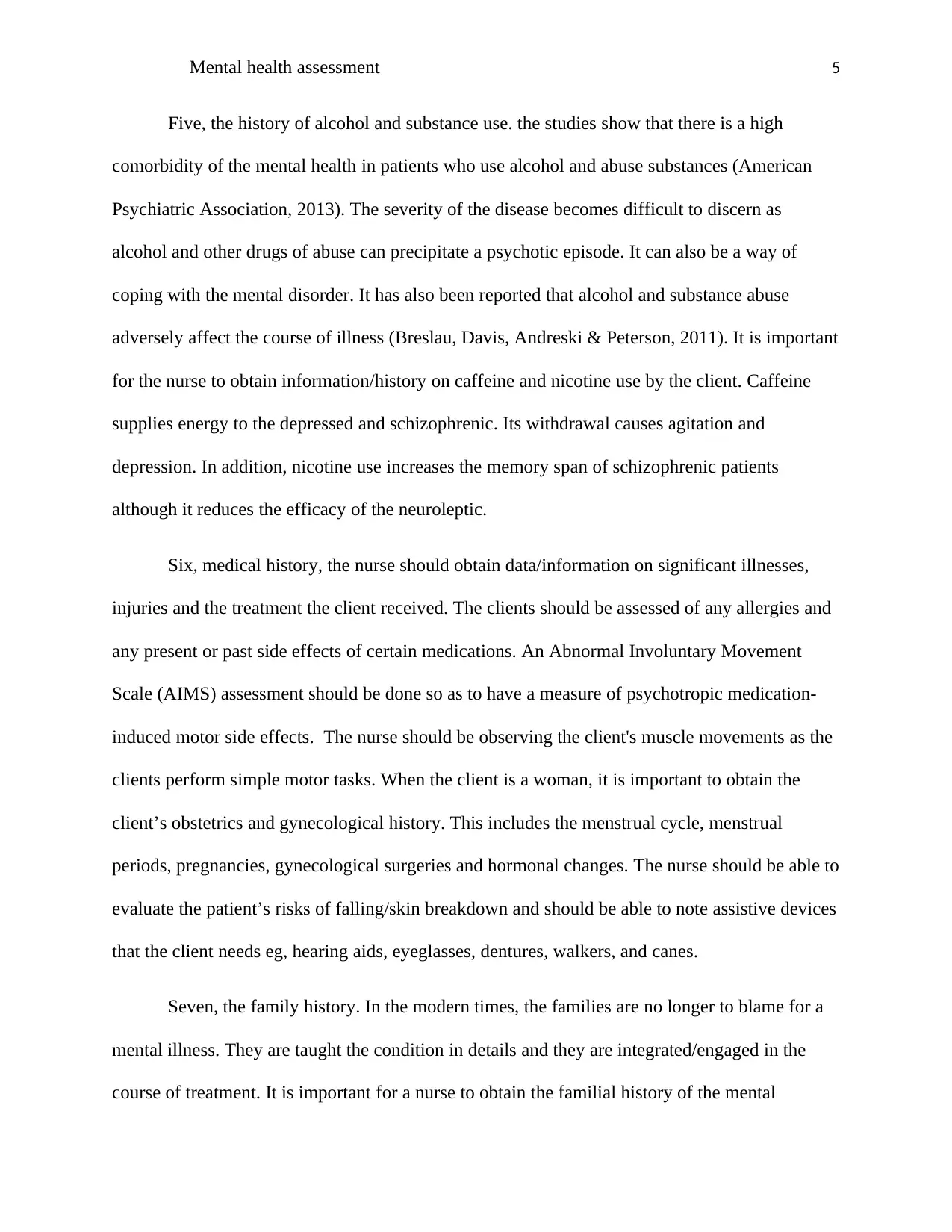
Mental health assessment 5
Five, the history of alcohol and substance use. the studies show that there is a high
comorbidity of the mental health in patients who use alcohol and abuse substances (American
Psychiatric Association, 2013). The severity of the disease becomes difficult to discern as
alcohol and other drugs of abuse can precipitate a psychotic episode. It can also be a way of
coping with the mental disorder. It has also been reported that alcohol and substance abuse
adversely affect the course of illness (Breslau, Davis, Andreski & Peterson, 2011). It is important
for the nurse to obtain information/history on caffeine and nicotine use by the client. Caffeine
supplies energy to the depressed and schizophrenic. Its withdrawal causes agitation and
depression. In addition, nicotine use increases the memory span of schizophrenic patients
although it reduces the efficacy of the neuroleptic.
Six, medical history, the nurse should obtain data/information on significant illnesses,
injuries and the treatment the client received. The clients should be assessed of any allergies and
any present or past side effects of certain medications. An Abnormal Involuntary Movement
Scale (AIMS) assessment should be done so as to have a measure of psychotropic medication-
induced motor side effects. The nurse should be observing the client's muscle movements as the
clients perform simple motor tasks. When the client is a woman, it is important to obtain the
client’s obstetrics and gynecological history. This includes the menstrual cycle, menstrual
periods, pregnancies, gynecological surgeries and hormonal changes. The nurse should be able to
evaluate the patient’s risks of falling/skin breakdown and should be able to note assistive devices
that the client needs eg, hearing aids, eyeglasses, dentures, walkers, and canes.
Seven, the family history. In the modern times, the families are no longer to blame for a
mental illness. They are taught the condition in details and they are integrated/engaged in the
course of treatment. It is important for a nurse to obtain the familial history of the mental
Five, the history of alcohol and substance use. the studies show that there is a high
comorbidity of the mental health in patients who use alcohol and abuse substances (American
Psychiatric Association, 2013). The severity of the disease becomes difficult to discern as
alcohol and other drugs of abuse can precipitate a psychotic episode. It can also be a way of
coping with the mental disorder. It has also been reported that alcohol and substance abuse
adversely affect the course of illness (Breslau, Davis, Andreski & Peterson, 2011). It is important
for the nurse to obtain information/history on caffeine and nicotine use by the client. Caffeine
supplies energy to the depressed and schizophrenic. Its withdrawal causes agitation and
depression. In addition, nicotine use increases the memory span of schizophrenic patients
although it reduces the efficacy of the neuroleptic.
Six, medical history, the nurse should obtain data/information on significant illnesses,
injuries and the treatment the client received. The clients should be assessed of any allergies and
any present or past side effects of certain medications. An Abnormal Involuntary Movement
Scale (AIMS) assessment should be done so as to have a measure of psychotropic medication-
induced motor side effects. The nurse should be observing the client's muscle movements as the
clients perform simple motor tasks. When the client is a woman, it is important to obtain the
client’s obstetrics and gynecological history. This includes the menstrual cycle, menstrual
periods, pregnancies, gynecological surgeries and hormonal changes. The nurse should be able to
evaluate the patient’s risks of falling/skin breakdown and should be able to note assistive devices
that the client needs eg, hearing aids, eyeglasses, dentures, walkers, and canes.
Seven, the family history. In the modern times, the families are no longer to blame for a
mental illness. They are taught the condition in details and they are integrated/engaged in the
course of treatment. It is important for a nurse to obtain the familial history of the mental
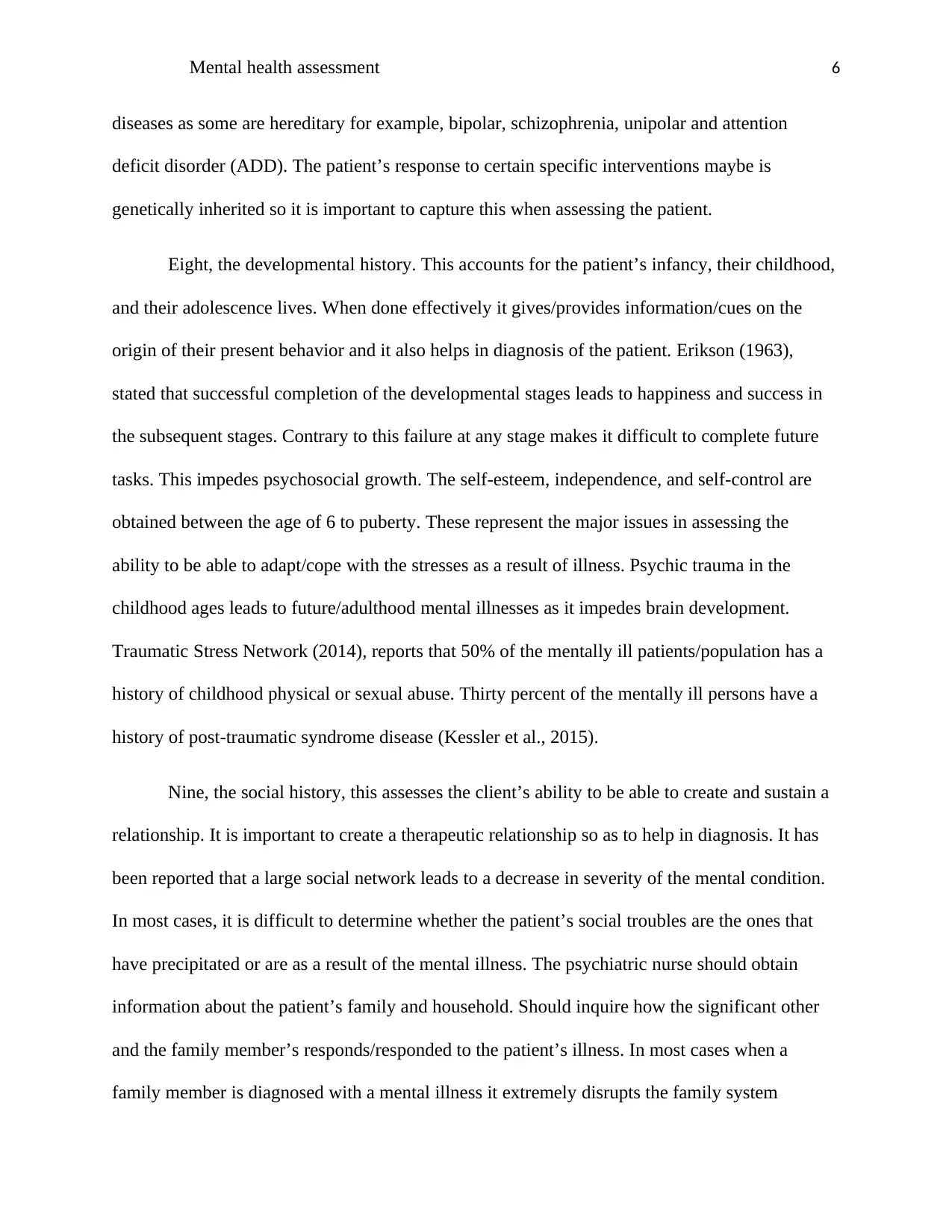
Mental health assessment 6
diseases as some are hereditary for example, bipolar, schizophrenia, unipolar and attention
deficit disorder (ADD). The patient’s response to certain specific interventions maybe is
genetically inherited so it is important to capture this when assessing the patient.
Eight, the developmental history. This accounts for the patient’s infancy, their childhood,
and their adolescence lives. When done effectively it gives/provides information/cues on the
origin of their present behavior and it also helps in diagnosis of the patient. Erikson (1963),
stated that successful completion of the developmental stages leads to happiness and success in
the subsequent stages. Contrary to this failure at any stage makes it difficult to complete future
tasks. This impedes psychosocial growth. The self-esteem, independence, and self-control are
obtained between the age of 6 to puberty. These represent the major issues in assessing the
ability to be able to adapt/cope with the stresses as a result of illness. Psychic trauma in the
childhood ages leads to future/adulthood mental illnesses as it impedes brain development.
Traumatic Stress Network (2014), reports that 50% of the mentally ill patients/population has a
history of childhood physical or sexual abuse. Thirty percent of the mentally ill persons have a
history of post-traumatic syndrome disease (Kessler et al., 2015).
Nine, the social history, this assesses the client’s ability to be able to create and sustain a
relationship. It is important to create a therapeutic relationship so as to help in diagnosis. It has
been reported that a large social network leads to a decrease in severity of the mental condition.
In most cases, it is difficult to determine whether the patient’s social troubles are the ones that
have precipitated or are as a result of the mental illness. The psychiatric nurse should obtain
information about the patient’s family and household. Should inquire how the significant other
and the family member’s responds/responded to the patient’s illness. In most cases when a
family member is diagnosed with a mental illness it extremely disrupts the family system
diseases as some are hereditary for example, bipolar, schizophrenia, unipolar and attention
deficit disorder (ADD). The patient’s response to certain specific interventions maybe is
genetically inherited so it is important to capture this when assessing the patient.
Eight, the developmental history. This accounts for the patient’s infancy, their childhood,
and their adolescence lives. When done effectively it gives/provides information/cues on the
origin of their present behavior and it also helps in diagnosis of the patient. Erikson (1963),
stated that successful completion of the developmental stages leads to happiness and success in
the subsequent stages. Contrary to this failure at any stage makes it difficult to complete future
tasks. This impedes psychosocial growth. The self-esteem, independence, and self-control are
obtained between the age of 6 to puberty. These represent the major issues in assessing the
ability to be able to adapt/cope with the stresses as a result of illness. Psychic trauma in the
childhood ages leads to future/adulthood mental illnesses as it impedes brain development.
Traumatic Stress Network (2014), reports that 50% of the mentally ill patients/population has a
history of childhood physical or sexual abuse. Thirty percent of the mentally ill persons have a
history of post-traumatic syndrome disease (Kessler et al., 2015).
Nine, the social history, this assesses the client’s ability to be able to create and sustain a
relationship. It is important to create a therapeutic relationship so as to help in diagnosis. It has
been reported that a large social network leads to a decrease in severity of the mental condition.
In most cases, it is difficult to determine whether the patient’s social troubles are the ones that
have precipitated or are as a result of the mental illness. The psychiatric nurse should obtain
information about the patient’s family and household. Should inquire how the significant other
and the family member’s responds/responded to the patient’s illness. In most cases when a
family member is diagnosed with a mental illness it extremely disrupts the family system
⊘ This is a preview!⊘
Do you want full access?
Subscribe today to unlock all pages.

Trusted by 1+ million students worldwide
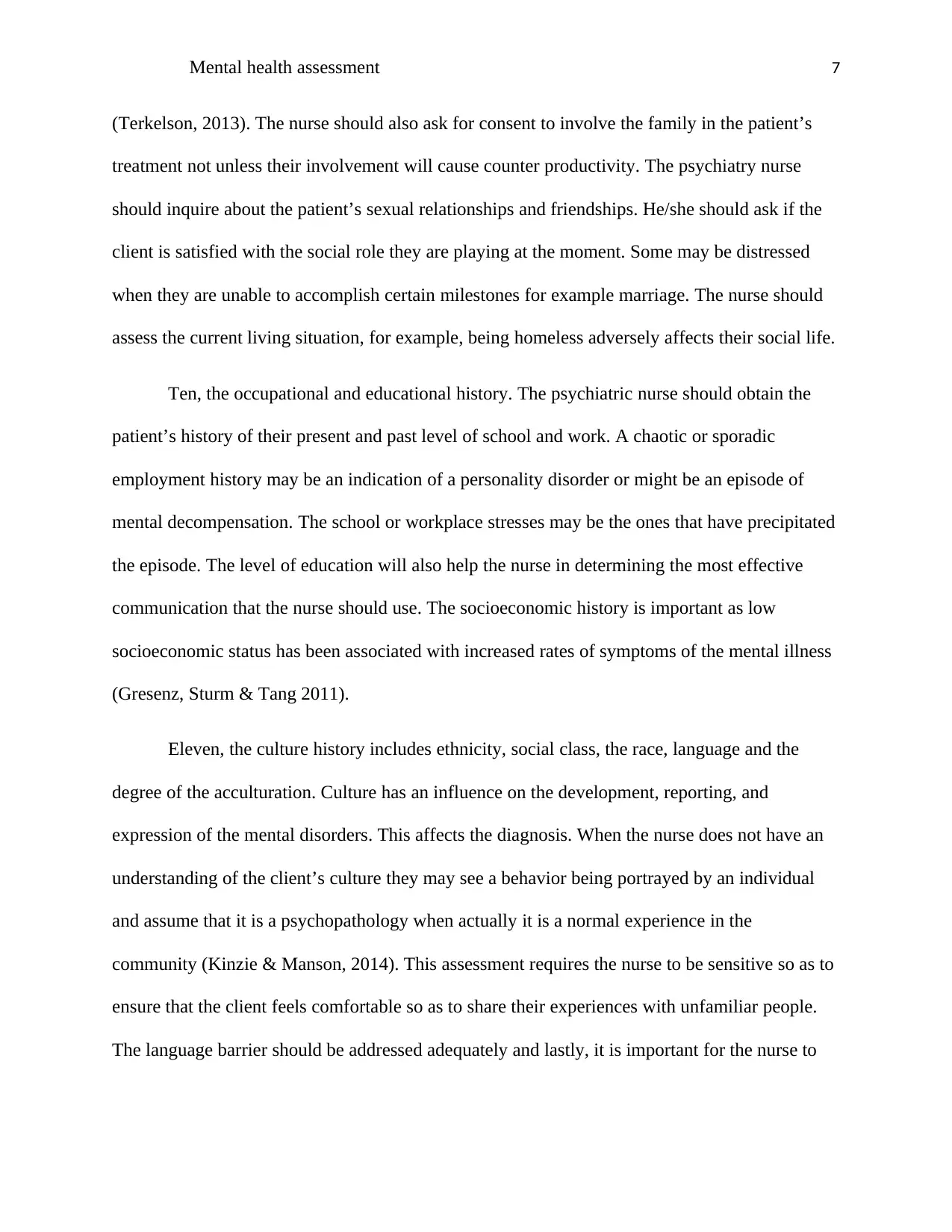
Mental health assessment 7
(Terkelson, 2013). The nurse should also ask for consent to involve the family in the patient’s
treatment not unless their involvement will cause counter productivity. The psychiatry nurse
should inquire about the patient’s sexual relationships and friendships. He/she should ask if the
client is satisfied with the social role they are playing at the moment. Some may be distressed
when they are unable to accomplish certain milestones for example marriage. The nurse should
assess the current living situation, for example, being homeless adversely affects their social life.
Ten, the occupational and educational history. The psychiatric nurse should obtain the
patient’s history of their present and past level of school and work. A chaotic or sporadic
employment history may be an indication of a personality disorder or might be an episode of
mental decompensation. The school or workplace stresses may be the ones that have precipitated
the episode. The level of education will also help the nurse in determining the most effective
communication that the nurse should use. The socioeconomic history is important as low
socioeconomic status has been associated with increased rates of symptoms of the mental illness
(Gresenz, Sturm & Tang 2011).
Eleven, the culture history includes ethnicity, social class, the race, language and the
degree of the acculturation. Culture has an influence on the development, reporting, and
expression of the mental disorders. This affects the diagnosis. When the nurse does not have an
understanding of the client’s culture they may see a behavior being portrayed by an individual
and assume that it is a psychopathology when actually it is a normal experience in the
community (Kinzie & Manson, 2014). This assessment requires the nurse to be sensitive so as to
ensure that the client feels comfortable so as to share their experiences with unfamiliar people.
The language barrier should be addressed adequately and lastly, it is important for the nurse to
(Terkelson, 2013). The nurse should also ask for consent to involve the family in the patient’s
treatment not unless their involvement will cause counter productivity. The psychiatry nurse
should inquire about the patient’s sexual relationships and friendships. He/she should ask if the
client is satisfied with the social role they are playing at the moment. Some may be distressed
when they are unable to accomplish certain milestones for example marriage. The nurse should
assess the current living situation, for example, being homeless adversely affects their social life.
Ten, the occupational and educational history. The psychiatric nurse should obtain the
patient’s history of their present and past level of school and work. A chaotic or sporadic
employment history may be an indication of a personality disorder or might be an episode of
mental decompensation. The school or workplace stresses may be the ones that have precipitated
the episode. The level of education will also help the nurse in determining the most effective
communication that the nurse should use. The socioeconomic history is important as low
socioeconomic status has been associated with increased rates of symptoms of the mental illness
(Gresenz, Sturm & Tang 2011).
Eleven, the culture history includes ethnicity, social class, the race, language and the
degree of the acculturation. Culture has an influence on the development, reporting, and
expression of the mental disorders. This affects the diagnosis. When the nurse does not have an
understanding of the client’s culture they may see a behavior being portrayed by an individual
and assume that it is a psychopathology when actually it is a normal experience in the
community (Kinzie & Manson, 2014). This assessment requires the nurse to be sensitive so as to
ensure that the client feels comfortable so as to share their experiences with unfamiliar people.
The language barrier should be addressed adequately and lastly, it is important for the nurse to
Paraphrase This Document
Need a fresh take? Get an instant paraphrase of this document with our AI Paraphraser
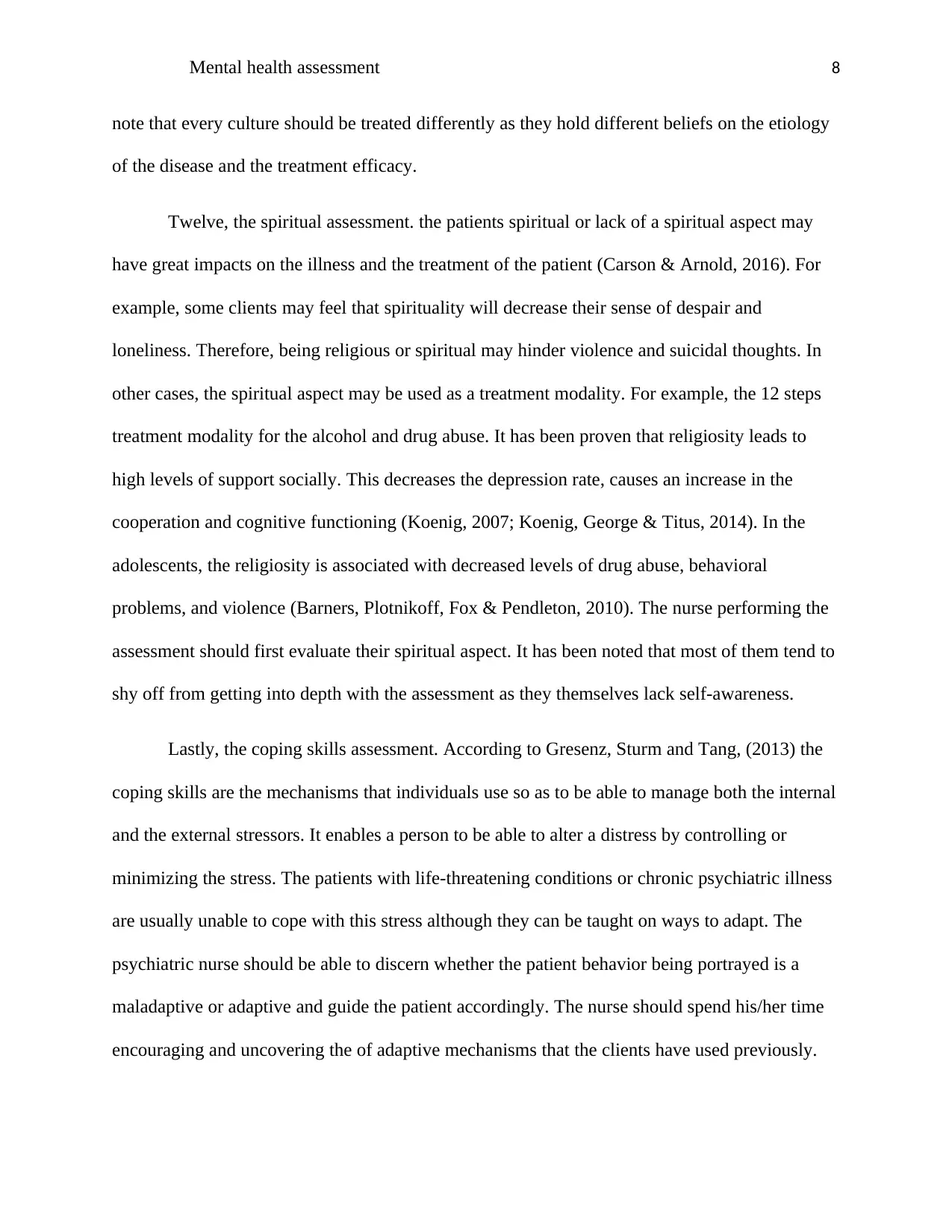
Mental health assessment 8
note that every culture should be treated differently as they hold different beliefs on the etiology
of the disease and the treatment efficacy.
Twelve, the spiritual assessment. the patients spiritual or lack of a spiritual aspect may
have great impacts on the illness and the treatment of the patient (Carson & Arnold, 2016). For
example, some clients may feel that spirituality will decrease their sense of despair and
loneliness. Therefore, being religious or spiritual may hinder violence and suicidal thoughts. In
other cases, the spiritual aspect may be used as a treatment modality. For example, the 12 steps
treatment modality for the alcohol and drug abuse. It has been proven that religiosity leads to
high levels of support socially. This decreases the depression rate, causes an increase in the
cooperation and cognitive functioning (Koenig, 2007; Koenig, George & Titus, 2014). In the
adolescents, the religiosity is associated with decreased levels of drug abuse, behavioral
problems, and violence (Barners, Plotnikoff, Fox & Pendleton, 2010). The nurse performing the
assessment should first evaluate their spiritual aspect. It has been noted that most of them tend to
shy off from getting into depth with the assessment as they themselves lack self-awareness.
Lastly, the coping skills assessment. According to Gresenz, Sturm and Tang, (2013) the
coping skills are the mechanisms that individuals use so as to be able to manage both the internal
and the external stressors. It enables a person to be able to alter a distress by controlling or
minimizing the stress. The patients with life-threatening conditions or chronic psychiatric illness
are usually unable to cope with this stress although they can be taught on ways to adapt. The
psychiatric nurse should be able to discern whether the patient behavior being portrayed is a
maladaptive or adaptive and guide the patient accordingly. The nurse should spend his/her time
encouraging and uncovering the of adaptive mechanisms that the clients have used previously.
note that every culture should be treated differently as they hold different beliefs on the etiology
of the disease and the treatment efficacy.
Twelve, the spiritual assessment. the patients spiritual or lack of a spiritual aspect may
have great impacts on the illness and the treatment of the patient (Carson & Arnold, 2016). For
example, some clients may feel that spirituality will decrease their sense of despair and
loneliness. Therefore, being religious or spiritual may hinder violence and suicidal thoughts. In
other cases, the spiritual aspect may be used as a treatment modality. For example, the 12 steps
treatment modality for the alcohol and drug abuse. It has been proven that religiosity leads to
high levels of support socially. This decreases the depression rate, causes an increase in the
cooperation and cognitive functioning (Koenig, 2007; Koenig, George & Titus, 2014). In the
adolescents, the religiosity is associated with decreased levels of drug abuse, behavioral
problems, and violence (Barners, Plotnikoff, Fox & Pendleton, 2010). The nurse performing the
assessment should first evaluate their spiritual aspect. It has been noted that most of them tend to
shy off from getting into depth with the assessment as they themselves lack self-awareness.
Lastly, the coping skills assessment. According to Gresenz, Sturm and Tang, (2013) the
coping skills are the mechanisms that individuals use so as to be able to manage both the internal
and the external stressors. It enables a person to be able to alter a distress by controlling or
minimizing the stress. The patients with life-threatening conditions or chronic psychiatric illness
are usually unable to cope with this stress although they can be taught on ways to adapt. The
psychiatric nurse should be able to discern whether the patient behavior being portrayed is a
maladaptive or adaptive and guide the patient accordingly. The nurse should spend his/her time
encouraging and uncovering the of adaptive mechanisms that the clients have used previously.
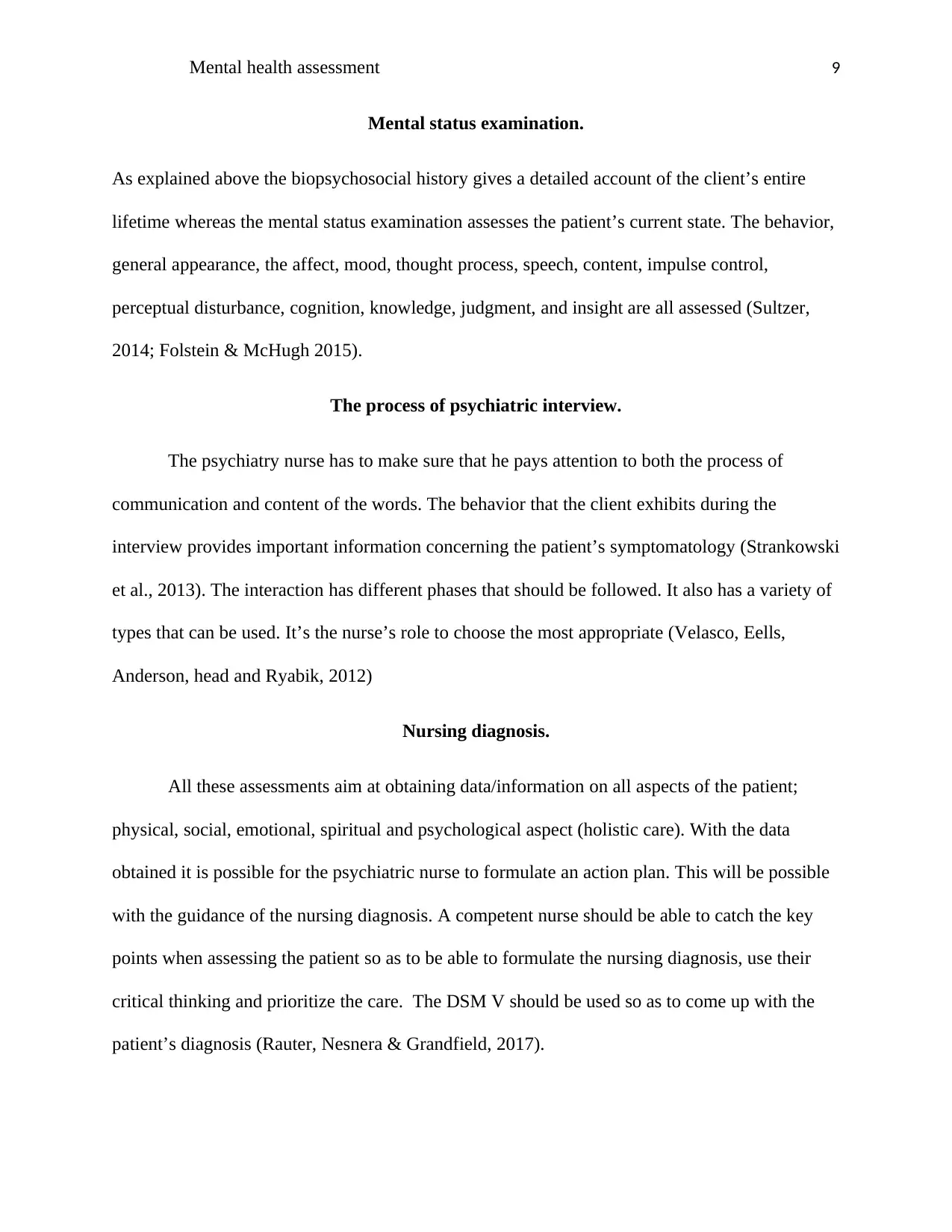
Mental health assessment 9
Mental status examination.
As explained above the biopsychosocial history gives a detailed account of the client’s entire
lifetime whereas the mental status examination assesses the patient’s current state. The behavior,
general appearance, the affect, mood, thought process, speech, content, impulse control,
perceptual disturbance, cognition, knowledge, judgment, and insight are all assessed (Sultzer,
2014; Folstein & McHugh 2015).
The process of psychiatric interview.
The psychiatry nurse has to make sure that he pays attention to both the process of
communication and content of the words. The behavior that the client exhibits during the
interview provides important information concerning the patient’s symptomatology (Strankowski
et al., 2013). The interaction has different phases that should be followed. It also has a variety of
types that can be used. It’s the nurse’s role to choose the most appropriate (Velasco, Eells,
Anderson, head and Ryabik, 2012)
Nursing diagnosis.
All these assessments aim at obtaining data/information on all aspects of the patient;
physical, social, emotional, spiritual and psychological aspect (holistic care). With the data
obtained it is possible for the psychiatric nurse to formulate an action plan. This will be possible
with the guidance of the nursing diagnosis. A competent nurse should be able to catch the key
points when assessing the patient so as to be able to formulate the nursing diagnosis, use their
critical thinking and prioritize the care. The DSM V should be used so as to come up with the
patient’s diagnosis (Rauter, Nesnera & Grandfield, 2017).
Mental status examination.
As explained above the biopsychosocial history gives a detailed account of the client’s entire
lifetime whereas the mental status examination assesses the patient’s current state. The behavior,
general appearance, the affect, mood, thought process, speech, content, impulse control,
perceptual disturbance, cognition, knowledge, judgment, and insight are all assessed (Sultzer,
2014; Folstein & McHugh 2015).
The process of psychiatric interview.
The psychiatry nurse has to make sure that he pays attention to both the process of
communication and content of the words. The behavior that the client exhibits during the
interview provides important information concerning the patient’s symptomatology (Strankowski
et al., 2013). The interaction has different phases that should be followed. It also has a variety of
types that can be used. It’s the nurse’s role to choose the most appropriate (Velasco, Eells,
Anderson, head and Ryabik, 2012)
Nursing diagnosis.
All these assessments aim at obtaining data/information on all aspects of the patient;
physical, social, emotional, spiritual and psychological aspect (holistic care). With the data
obtained it is possible for the psychiatric nurse to formulate an action plan. This will be possible
with the guidance of the nursing diagnosis. A competent nurse should be able to catch the key
points when assessing the patient so as to be able to formulate the nursing diagnosis, use their
critical thinking and prioritize the care. The DSM V should be used so as to come up with the
patient’s diagnosis (Rauter, Nesnera & Grandfield, 2017).
⊘ This is a preview!⊘
Do you want full access?
Subscribe today to unlock all pages.

Trusted by 1+ million students worldwide
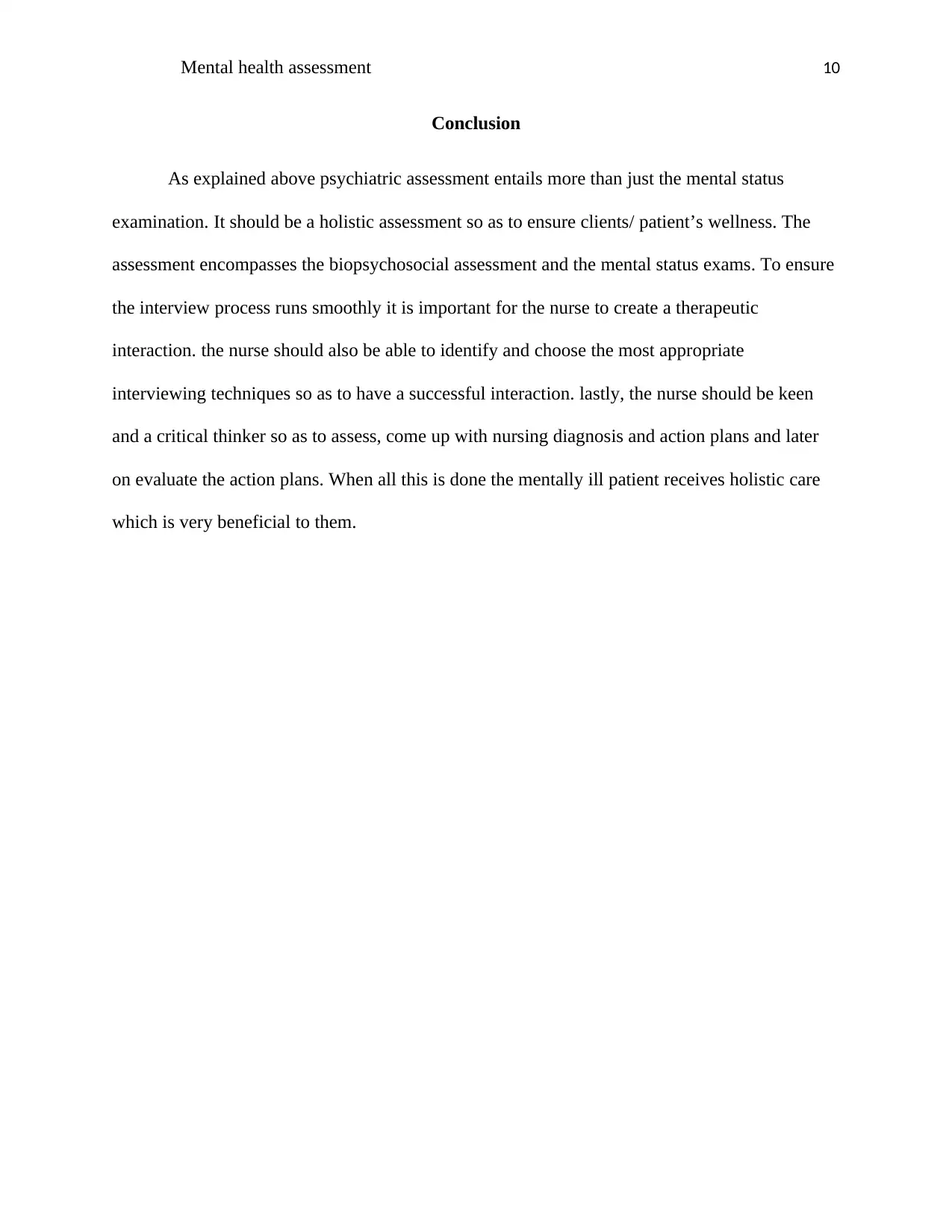
Mental health assessment 10
Conclusion
As explained above psychiatric assessment entails more than just the mental status
examination. It should be a holistic assessment so as to ensure clients/ patient’s wellness. The
assessment encompasses the biopsychosocial assessment and the mental status exams. To ensure
the interview process runs smoothly it is important for the nurse to create a therapeutic
interaction. the nurse should also be able to identify and choose the most appropriate
interviewing techniques so as to have a successful interaction. lastly, the nurse should be keen
and a critical thinker so as to assess, come up with nursing diagnosis and action plans and later
on evaluate the action plans. When all this is done the mentally ill patient receives holistic care
which is very beneficial to them.
Conclusion
As explained above psychiatric assessment entails more than just the mental status
examination. It should be a holistic assessment so as to ensure clients/ patient’s wellness. The
assessment encompasses the biopsychosocial assessment and the mental status exams. To ensure
the interview process runs smoothly it is important for the nurse to create a therapeutic
interaction. the nurse should also be able to identify and choose the most appropriate
interviewing techniques so as to have a successful interaction. lastly, the nurse should be keen
and a critical thinker so as to assess, come up with nursing diagnosis and action plans and later
on evaluate the action plans. When all this is done the mentally ill patient receives holistic care
which is very beneficial to them.
Paraphrase This Document
Need a fresh take? Get an instant paraphrase of this document with our AI Paraphraser
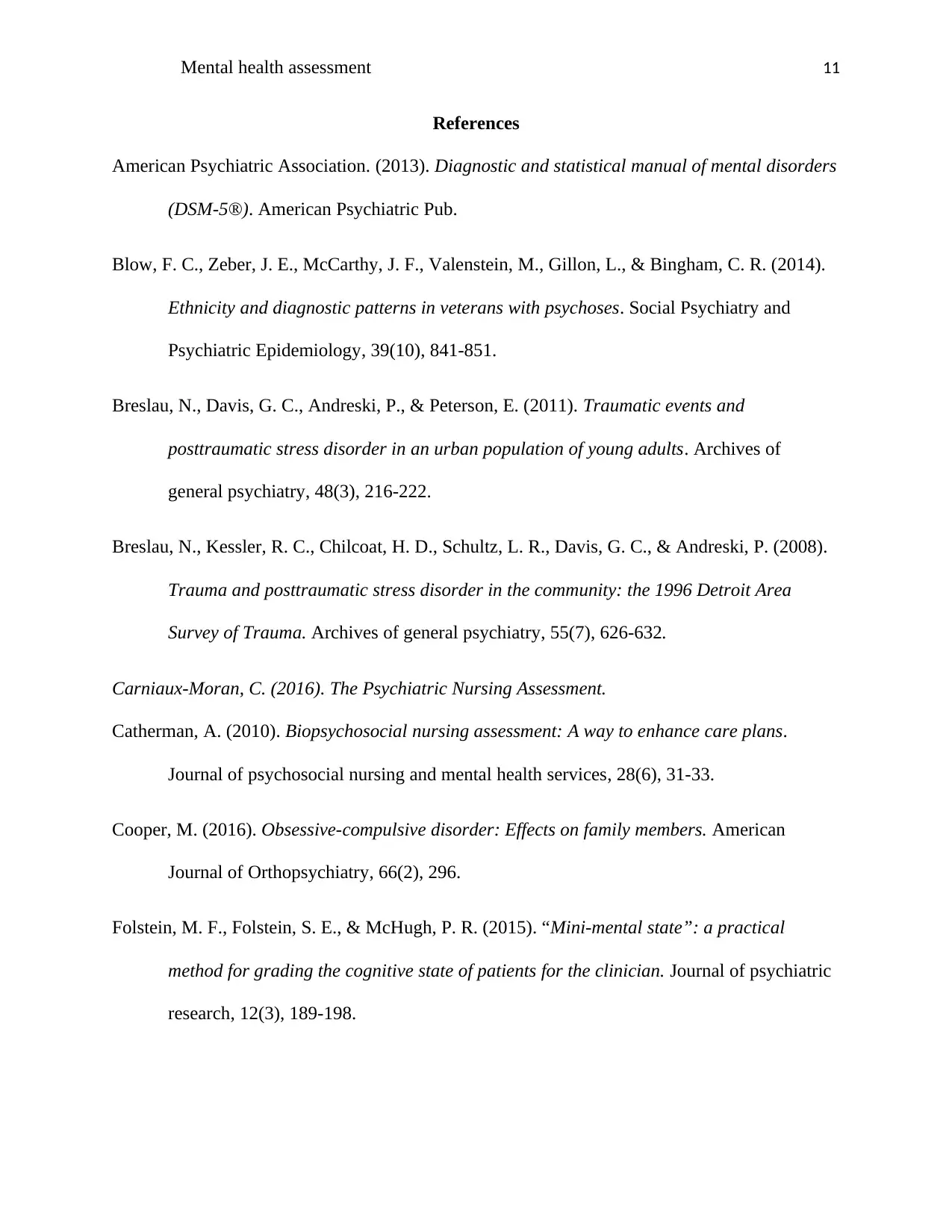
Mental health assessment 11
References
American Psychiatric Association. (2013). Diagnostic and statistical manual of mental disorders
(DSM-5®). American Psychiatric Pub.
Blow, F. C., Zeber, J. E., McCarthy, J. F., Valenstein, M., Gillon, L., & Bingham, C. R. (2014).
Ethnicity and diagnostic patterns in veterans with psychoses. Social Psychiatry and
Psychiatric Epidemiology, 39(10), 841-851.
Breslau, N., Davis, G. C., Andreski, P., & Peterson, E. (2011). Traumatic events and
posttraumatic stress disorder in an urban population of young adults. Archives of
general psychiatry, 48(3), 216-222.
Breslau, N., Kessler, R. C., Chilcoat, H. D., Schultz, L. R., Davis, G. C., & Andreski, P. (2008).
Trauma and posttraumatic stress disorder in the community: the 1996 Detroit Area
Survey of Trauma. Archives of general psychiatry, 55(7), 626-632.
Carniaux-Moran, C. (2016). The Psychiatric Nursing Assessment.
Catherman, A. (2010). Biopsychosocial nursing assessment: A way to enhance care plans.
Journal of psychosocial nursing and mental health services, 28(6), 31-33.
Cooper, M. (2016). Obsessive-compulsive disorder: Effects on family members. American
Journal of Orthopsychiatry, 66(2), 296.
Folstein, M. F., Folstein, S. E., & McHugh, P. R. (2015). “Mini-mental state”: a practical
method for grading the cognitive state of patients for the clinician. Journal of psychiatric
research, 12(3), 189-198.
References
American Psychiatric Association. (2013). Diagnostic and statistical manual of mental disorders
(DSM-5®). American Psychiatric Pub.
Blow, F. C., Zeber, J. E., McCarthy, J. F., Valenstein, M., Gillon, L., & Bingham, C. R. (2014).
Ethnicity and diagnostic patterns in veterans with psychoses. Social Psychiatry and
Psychiatric Epidemiology, 39(10), 841-851.
Breslau, N., Davis, G. C., Andreski, P., & Peterson, E. (2011). Traumatic events and
posttraumatic stress disorder in an urban population of young adults. Archives of
general psychiatry, 48(3), 216-222.
Breslau, N., Kessler, R. C., Chilcoat, H. D., Schultz, L. R., Davis, G. C., & Andreski, P. (2008).
Trauma and posttraumatic stress disorder in the community: the 1996 Detroit Area
Survey of Trauma. Archives of general psychiatry, 55(7), 626-632.
Carniaux-Moran, C. (2016). The Psychiatric Nursing Assessment.
Catherman, A. (2010). Biopsychosocial nursing assessment: A way to enhance care plans.
Journal of psychosocial nursing and mental health services, 28(6), 31-33.
Cooper, M. (2016). Obsessive-compulsive disorder: Effects on family members. American
Journal of Orthopsychiatry, 66(2), 296.
Folstein, M. F., Folstein, S. E., & McHugh, P. R. (2015). “Mini-mental state”: a practical
method for grading the cognitive state of patients for the clinician. Journal of psychiatric
research, 12(3), 189-198.
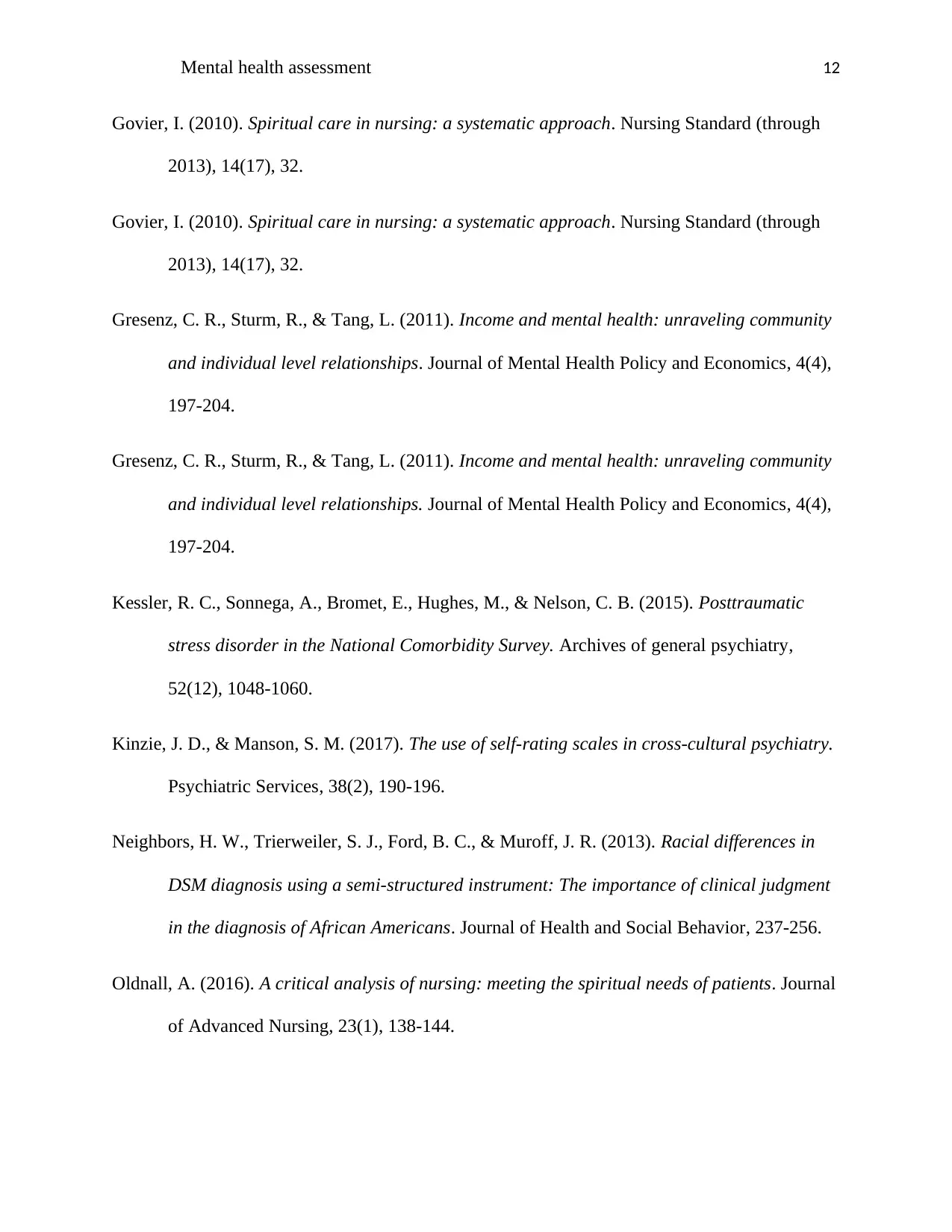
Mental health assessment 12
Govier, I. (2010). Spiritual care in nursing: a systematic approach. Nursing Standard (through
2013), 14(17), 32.
Govier, I. (2010). Spiritual care in nursing: a systematic approach. Nursing Standard (through
2013), 14(17), 32.
Gresenz, C. R., Sturm, R., & Tang, L. (2011). Income and mental health: unraveling community
and individual level relationships. Journal of Mental Health Policy and Economics, 4(4),
197-204.
Gresenz, C. R., Sturm, R., & Tang, L. (2011). Income and mental health: unraveling community
and individual level relationships. Journal of Mental Health Policy and Economics, 4(4),
197-204.
Kessler, R. C., Sonnega, A., Bromet, E., Hughes, M., & Nelson, C. B. (2015). Posttraumatic
stress disorder in the National Comorbidity Survey. Archives of general psychiatry,
52(12), 1048-1060.
Kinzie, J. D., & Manson, S. M. (2017). The use of self-rating scales in cross-cultural psychiatry.
Psychiatric Services, 38(2), 190-196.
Neighbors, H. W., Trierweiler, S. J., Ford, B. C., & Muroff, J. R. (2013). Racial differences in
DSM diagnosis using a semi-structured instrument: The importance of clinical judgment
in the diagnosis of African Americans. Journal of Health and Social Behavior, 237-256.
Oldnall, A. (2016). A critical analysis of nursing: meeting the spiritual needs of patients. Journal
of Advanced Nursing, 23(1), 138-144.
Govier, I. (2010). Spiritual care in nursing: a systematic approach. Nursing Standard (through
2013), 14(17), 32.
Govier, I. (2010). Spiritual care in nursing: a systematic approach. Nursing Standard (through
2013), 14(17), 32.
Gresenz, C. R., Sturm, R., & Tang, L. (2011). Income and mental health: unraveling community
and individual level relationships. Journal of Mental Health Policy and Economics, 4(4),
197-204.
Gresenz, C. R., Sturm, R., & Tang, L. (2011). Income and mental health: unraveling community
and individual level relationships. Journal of Mental Health Policy and Economics, 4(4),
197-204.
Kessler, R. C., Sonnega, A., Bromet, E., Hughes, M., & Nelson, C. B. (2015). Posttraumatic
stress disorder in the National Comorbidity Survey. Archives of general psychiatry,
52(12), 1048-1060.
Kinzie, J. D., & Manson, S. M. (2017). The use of self-rating scales in cross-cultural psychiatry.
Psychiatric Services, 38(2), 190-196.
Neighbors, H. W., Trierweiler, S. J., Ford, B. C., & Muroff, J. R. (2013). Racial differences in
DSM diagnosis using a semi-structured instrument: The importance of clinical judgment
in the diagnosis of African Americans. Journal of Health and Social Behavior, 237-256.
Oldnall, A. (2016). A critical analysis of nursing: meeting the spiritual needs of patients. Journal
of Advanced Nursing, 23(1), 138-144.
⊘ This is a preview!⊘
Do you want full access?
Subscribe today to unlock all pages.

Trusted by 1+ million students worldwide
1 out of 13
Related Documents
Your All-in-One AI-Powered Toolkit for Academic Success.
+13062052269
info@desklib.com
Available 24*7 on WhatsApp / Email
![[object Object]](/_next/static/media/star-bottom.7253800d.svg)
Unlock your academic potential
Copyright © 2020–2026 A2Z Services. All Rights Reserved. Developed and managed by ZUCOL.




